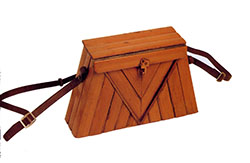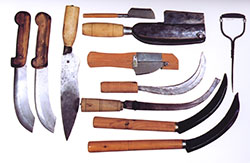In notional Confucian hierarchy, the peasantry ranked above the merchant class. In practice this hardly represented real status, but it was a sign of the regard for basic productive labour. The quality and care given to tools and everyday labour environments was also a signal of dignity.
Literati and Jiangnan people were very discerning in their use of simple materials that were the basis of everyday handicraft. Bamboo, rattan, wood and ceramic were shaped according to simplicity and a straightforward use of the natural proclivities of each substance. Decorative pleasure was considered, but often followed the lead suggested by the grain or surface of a material.
Simple packaging for the transport of fragile goods also shows this spirit well. Ultimately disposable, the materials used were biodegradable and were employed with minimal elaboration.
In being attainable by all and establishing a common material experience among the classes, the use of materials in daily life created a subtle social solidarity. It gave dignity to all, and imparted gracefulness to the everyday. These attentions were also echoed in poetic appreciations of farming and fishing and in metaphors from everyday life used in Taoist expositions.
| | 
 | 
 |